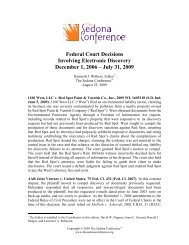Chambers Handbook for Judges - Federal Judicial Center
Chambers Handbook for Judges - Federal Judicial Center
Chambers Handbook for Judges - Federal Judicial Center
You also want an ePaper? Increase the reach of your titles
YUMPU automatically turns print PDFs into web optimized ePapers that Google loves.
ments on their time. Specific aspects of this problem are discussed in<br />
several sections of this handbook.<br />
Law clerks and secretaries <strong>for</strong> district court, bankruptcy court, and<br />
magistrate judges have substantially more contact with attorneys and<br />
witnesses than do their appellate court counterparts. The principal function<br />
of an appellate court law clerk is to research and write about the<br />
issues presented by an appeal, while law clerks <strong>for</strong> district, bankruptcy,<br />
and magistrate judges are involved in the many decisions made at every<br />
stage of each case. Chapter 5, “<strong>Chambers</strong> and Case Management,”<br />
discusses in some detail the operations of district, bankruptcy, and appellate<br />
courts.<br />
A clerkship can be viewed as a continuation of one’s legal education.<br />
The education gained as a law clerk is practical; clerks participate<br />
in real court activity and decisions. They learn about law from the judge,<br />
who was <strong>for</strong>merly an accomplished practitioner or educator, and by<br />
attending trials, conferences, or oral arguments. The education is not<br />
limited to legal analysis: It includes exposure to the methods and customs<br />
of practitioners and the level of professional behavior expected<br />
of lawyers, as well as experience with the full range of legal styles and<br />
abilities presented in federal court. A clerkship provides direct insight<br />
into the judicial process, a unique opportunity <strong>for</strong> those interested in<br />
litigation or teaching. Moreover, law clerks face significant contemporary<br />
legal issues and have the opportunity to consider the social and<br />
economic implications of deciding cases that implicate those issues.<br />
Observing the challenging roles that judges and lawyers play in the<br />
resolution of controversies and contributing to that process add to the<br />
law clerk’s professional development.<br />
§ 1-2. History<br />
For more than a century, chambers staff have aided federal judges in<br />
legal and administrative matters. Justice Horace Gray, appointed to the<br />
Supreme Court of the United States in 1881, introduced to that Court<br />
his practice (originally adopted while he was Chief Justice of the Supreme<br />
<strong>Judicial</strong> Court of Massachusetts) of employing, at his own expense,<br />
an honor graduate of Harvard Law School as his secretary. Gray’s<br />
2 <strong>Chambers</strong> <strong>Handbook</strong> <strong>for</strong> <strong>Judges</strong>’ Law Clerks and Secretaries

















